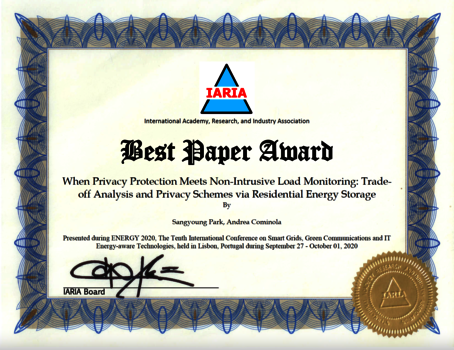The paper When Privacy Protection Meets Non-Intrusive Load Monitoring: Trade-off Analysis and Privacy Schemes via Residential Energy Storage", authored by ECDF professors Andrea Cominola and Sangyoung Park, was one of three papers selected as a "Best Paper" at the International Conference on Smart Grids, Green Communications and Energy-Aware IT Technologies (IARIA). The conference was held from 27 September to 01 October 2020.
Abstract: Non-Intrusive Load Monitoring (NILM) algorithms are actively being researched to disaggregate the electricity usage of a whole household into the contribution of individual appliances. While understanding the usage patterns of individual appliances can be beneficial for flattening the peak demand, reducing the electricity bill, and improving the energy usage efficiency, NILM algorithms raise privacy concerns. Residential energy storage could be used to relieve such concerns by modifying the monitored electricity profile. However, residential energy storage systems are yet costly, and hence assessing the financial overhead of privacy protection techniques is important. In this paper, we provide motivational examples and early results on how much residential energy storage would be required to fool a state-of-the-art NILM algorithm. Our preliminary results on the trade-off between NILM accuracy and privacy protection indicate that some intuitive approaches that require a significant amount of battery capacity are not necessarily the most effective in reducing the disaggregation accuracy.
The article can be accessed //here.

